Immigration

When I was a child, my vision of heaven was riddled with roller coasters and populated by Disney characters. Let me explain.
Growing up in Puerto Rico, the American “mainland” to our north was for me a dreamland of sorts. You could catch a glimpse of it on television show depicting Main Streets lined with impressive trees. And of course, there was Disney World. As a five-year old visiting Florida for the first time, I imagined that the rest of the country was just like that particular corner of Orlando that we tourists saw.
That was heaven on earth for the five-year-old version of me. Heaven was earthly and joyful and fun and sweet. But as we all know Disney is no paradise. I don’t expect long lines, lots of sweat, and expensive but mediocre food in heaven.
When I was five, Disney was my vision of heaven. As I grew up in the church, my vision turned upward. Heaven was an eternal destination deferred until the moment after you die. Heaven was a place of reward and eternity. Heaven was an ethereal experience, something so otherworldly that the best we could do was speak in metaphors and images about it. Heaven, in short, had very little to do with the world as we knew it.
Neither vision gets it quite right.

A new report on the “Shifting Religious Identity of Latinos” reads very much like a biography of Fernando Alcantar.
But once he moved to California after high school, his faith journey diverged — and derailed. Today, Alcantar, 36 calls himself a humanist.
The Pew survey report released Wednesday is subtitled: “Nearly One in Four Latinos are former Catholics.” And Alcantar is one of them.
A little over a week after Easter, more than 250 pastors descended upon Washington, D.C., to worship, pray, and meet with their members of Congress. After preaching about the resurrection of Christ, these pastors asked God to resurrect immigration reform.
A theologically and ethnically diverse group of pastors spoke at a press conference and a worship service before heading to the Capitol Building to meet with their representatives. The pastors told the heartbreaking stories of families in their congregations that had been separated because of the broken immigration system, God’s command to welcome the strangers in our midst, and prayed for God to change the hearts of the legislators who are stopping immigration reform from becoming law.
The event made one message abundantly clear: if immigration reform is going to happen, God is going to be the one who is going to get it done.
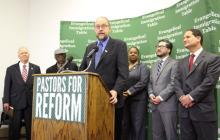
WASHINGTON — Trying yet again with new voices, more than 250 evangelical pastors came to Capitol Hill on Tuesday to push for immigration reform.
“I didn’t want people to think this was only a Hispanic issue,” said Eugene Cho, pastor of Quest Church in Seattle, at a news conference before meeting with dozens of mostly Republican members of Congress. “This is impacting a lot of people, including Asian-Americans.”
Cho, who is of Korean descent, was among the new faces demonstrating support for immigration reform across racial and ethnic groups and denominations. He pointed out that one out of five Korean-Americans are undocumented.
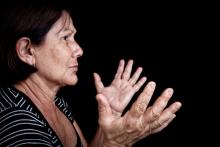
I recently looked out my front door and saw a woman sitting on the stairs of my patio. She was out of breath, sweaty, and had a large basket next to her full of cans and plastic bottles to be recycled. She looked desperately in need of some rest and refreshment. I’m pretty good at ignoring people in need (sadly), but when they come to your physical doorstep, I couldn’t imagine not stepping outside to check on this woman.
Opening our front door, she looked up at me with a bit of concern on her face thinking I might ask her to get off my patio. To calm her nerves, I simply sat down on the steps next to her and we exchanged warm smiles. Because she offered me a greeting in Spanish, I quickly realized she didn’t speak much English and I gave my best shot at speaking in Spanish. Over the next 10 minutes, we simply sat on my patio overlooking the main street of our neighborhood that runs in front of my house. Sometimes we talked, sometimes we just sat in comfortable silence. Her name was Conchetta. Finally, I asked if I could get her some food and a cold drink and she quickly said, “yes.”
After taking in some needed nourishment, Conchetta, offered me a warm smile filled with the richness of humanity and gratitude, and leisurely went back to work assembling the best of our neighborhoods “trash” so she could bring some life to her family.
Our faith community has spent a lot of time over the years becoming students of our neighborhood. As a result, we discovered that roughly 60 percent of our neighborhoods’ residents are Latino (most are Mexican because of our proximity to the border), and a high percentage of those are undocumented. In fact, it’s a safe assumption that my new friend, Conchetta, is undocumented.
Former Florida Gov. Jeb Bush recently stated that people who come into the country unauthorized to find work and support their families are doing so as “an act of love.” In a Miami Herald op-ed, Archbishop Thomas G. Wenski is of Miami echoed the idea that this conversation is fundamentally about people:
To demonize irregular migrants as “lawbreakers” certainly generates heat but does not give any light to the urgent task of fixing our broken immigration system. This is not to condone the violation of the law — but as Gov. Bush suggests, these migrants are not criminals. Being in the United States without proper documents is not a criminal felony but a civil misdemeanor.
With his comment, Gov. Bush hit a nerve that runs through the immigration debate… With one three-word phrase, Gov. Bush has helped humanize these migrants — they are human beings who love their families, just as Americans do . This runs counter to the rhetoric of many shrill anti-immigrant voices and reframes the debate in human terms.
Read full article HERE .





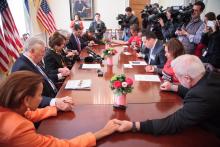
Boston’s Cardinal Sean O’Malley, the closest American prelate to Pope Francis, took nine other bishops to the Mexican-American border for three days of listening to the stories of people who are suffering from America’s horribly broken immigration system. The bishops celebrated a dramatic mass with hundreds of Mexicans, taking communion through slats in the security fence, and laid a wreath at the border commemorating the estimated 6000 people who have died trying to cross.
“We can no longer tolerate the suffering caused by a broken system,” the Cardinal said. “The suffering and death must end.”
When asked how important immigration reform now is to the Catholic Church, O’Malley replied, “It’s another pro-life issue.”
Indeed it is.

Washington, D.C.—The national “Fast for Families Across America” bus tour campaign ended their journey yesterday in front of the U.S. Capitol building on the National Mall where hundreds gathered in support.
The buses, which returned to Washington after covering more than 90 congressional districts during a seven week tour, joined a female immigration advocacy group, We Belong Together—Women for Commonsense Immigration Reform, whose members have been fasting and praying for the House to pass reform that’s needed to keep their families together.
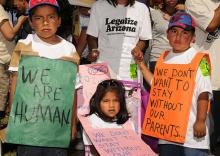
“That I may know him, and the power of his resurrection, and the fellowship of his sufferings, being made conformable unto his death; If by any means I might attain the resurrection of the dead.” Philippians 3:10-11
Harsh winters make us more deeply appreciative of spring. Last week, after a particularly intense winter, it finally reached 60 degrees in New York. I, for one, celebrated heartily. Spring is a reminder that winter is not interminable and flowers will bloom again. Almost exactly one year ago, the Senate released a bipartisan bill on immigration reform. Many Christian leaders celebrated the possibility that finally the nearly 11 million men, women, and children would be afforded the opportunity to integrate into this great country. In addition, in January the GOP released a set of principles that set the tone for the genuine possibility for immigration reform. There was a growing consensus that this is the year for immigration reform. Then the news started to change and many prognosticators said, “Immigration reform is dead.”
It is into this public eulogy of immigration reform that the Christian message of Lent and Easter can breathe new life.

Editor's Note: The following story originally appeared HERE in The Australian Financial Review.
Jarrod McKenna is in trouble. It's not that the dreadlocked Christian activist is at risk of being arrested, as he has been at several anti-war and anti-coal protests. Rather, he has let five-year-old Congolese refugee Zephanta Baganizi eat the leftovers of our very late lunch, shortly before dinner time.
"Have you asked your mum if it's OK?" McKenna asks "Zopho," who is gazing at several pieces of bolani, a vegan flat-bread meal from Afghanistan. Transfixed by the food, Zopho doesn't respond.
"Just a small piece, then."
Zopho grabs the biggest piece. He runs off to his family's apartment, mouth overflowing with fried bread and vegetable filling.
"I'm in trouble," McKenna says.
The interaction between Australian, Congolese and Afghan food, people and culture is not uncommon at a large block at the end of Dudley Street in the outer Perth suburb of Midland.
It is the location of First Home Project; a former methamphetamine lab transformed into three apartments that provide medium-term accommodation at below-market rates for refugees transitioning into their new Australian lives.
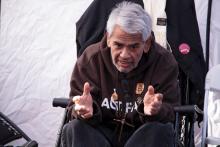
As an immigrant who made the long journey from Zacatecas, Mexico, to the farmlands of California many times as a child, the Lenten story of Jesus’s wandering for 40 days in the desert has always resonated with me very deeply. And the Easter celebration that follows sustains my hope and resolve that the faith community’s long movement to reform our broken immigration system will succeed.
Late last year, I, along with several other immigration advocates and inspiring faith leaders, camped out in a tent on the National Mall in Washington, D.C., to call attention to the moral crisis and human suffering caused by our broken immigration system. We asked ourselves: What are our faith, our words, and our history worth if not translated into action, sacrifice, and redemption?
So, for 30 days we fasted and prayed that leadership in the House of Representatives would follow the Senate’s lead and pass a comprehensive, bipartisan immigration reform bill. The power of prayer surrounded us as we were led in reflection on a daily basis by pastors who serve undocumented families, by immigrants who suffer under our unjust system, and by public officials who came to see our commitment as days without food turned into weeks.
Even though the House refused to act in 2013, we believe that our fast, and the support of thousands of solidarity fasters around the world, helped change the discussion about reform from one of dollars and cents to one about people and families. Our sacrifice and the suffering of our immigrant brothers and sisters will end in victory and redemption.

As we approach Holy Week, I’ve been re-reading the Gospel accounts of Jesus’ Last Supper, trial, crucifixion, and resurrection. In John 17, as Jesus prays for his disciples and their successors in the hours before he is arrested, he prays for our unity as his church:
…that all of them may be one, Father, just as you are in me and I am in you… May they be brought to complete unity to let the world know that you sent me and have loved them even as you have loved me. (John 17:21, 23)
Central to our mission as Christ’s followers is to share with the world this good news: that the Father sent the Son because he so loved the world — but the best observable evidence of that Gospel reality, a unified Church, seems a distant, utopian dream. Just within the United States — this small sliver of the global church — we are divided by denomination, by race, by political ideology, and by the competitive human instinct that leads even those congregations who resemble one another doctrinally, ethnically, and politically to jockey over the same individuals in order to fill their sanctuaries (or auditoriums) and offering plates. Perhaps the situation is not quite so stark: I know that many — probably most — believers share the desire for unity. It just seems at times that we have so far to go, and might be drifting in the wrong direction.
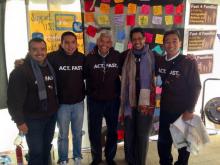
I was traveling to Culpeper, Va., on the #Fast4Families bus tour to speak to a group of workers assembled at St. Luke’s Lutheran Church. As we looked out the window we were struck that every 50 feet there stood a plaque marking the place where another significant battle took place in the Civil War.
As we sat down in the church, I didn’t know what I was going to say to all-immigrant group. My message up to that point had focused on mobilizing non-immigrants to join the movement. What could I say to this immigrant gathering?
I prayed. I asked God, “What do you want to speak to this group through me?’ And the dots started to connect.

